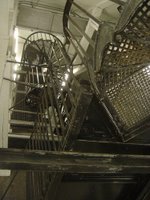Handspans in the dark.
 When I was a child, I used to love going down the stairs into my grandparents' basement alongside my grandmother. My grandparents lived in east Detroit, not far down the road from the Cadieux Café. They had the kind of house I hope to end up in: a bungalow with one bedroom downstairs, a living room, a TV room, a sunny kitchen (painted yellow, no less), and just one big under-the-roof-line room upstairs. A no-nonsense house, in short. The basement bore signs of having been a den for entertaining at some point before I was born: it had a giant console television that I don't remember ever having seen in use; it had a bar with swivel stools upholstered in red-striped vinyl; it had bamboo-frame couches and glass-topped end tables. And the heating duct pipe in the back corner was decorated to look like a coconut tree, replete with faux coconuts.
When I was a child, I used to love going down the stairs into my grandparents' basement alongside my grandmother. My grandparents lived in east Detroit, not far down the road from the Cadieux Café. They had the kind of house I hope to end up in: a bungalow with one bedroom downstairs, a living room, a TV room, a sunny kitchen (painted yellow, no less), and just one big under-the-roof-line room upstairs. A no-nonsense house, in short. The basement bore signs of having been a den for entertaining at some point before I was born: it had a giant console television that I don't remember ever having seen in use; it had a bar with swivel stools upholstered in red-striped vinyl; it had bamboo-frame couches and glass-topped end tables. And the heating duct pipe in the back corner was decorated to look like a coconut tree, replete with faux coconuts.What I loved most about going down the stairs into the basement, though, was that we had to go down backwards.
My grandmother's knees locked backward sometime in the late 1960s, due to cartilage disintegration; in pictures from around the time of my parents' wedding, it's already pretty clear that she'll be sitting and standing with her legs in one position for quite some time. Orthopedic surgeons told her as early as 1969 that she would be a prime candidate for knee replacement, if only they could assure her that the artificial knees (and, if I remember correctly, particularly their adhesives) would last more than a couple of decades. Since my grandmother was only in her mid-40s by that point, she elected to tough it out until the technology improved. By 1979, she had gone (with me and my newborn brother) on the last walk she would take around her block for the next fifteen years.
Because her knees didn't bend, my grandmother descended her basement steps backwards, dropping down one step at a time. I grasped that this practice was not a game--that we weren't playing around, heading down the stairs one at a time. And yet I looked forward to it, to the never-ending novelty of watching the house's side door recede as we backed away, down the linoleum-tiled steps, into the dark basement. She went on the right, where there was a railing; I went on the left. I am sure that she was in pain the entire time, but I don't have any memory of her having let on about that fact. As I got older and her knees got more and more stiff, the rest of us started running downstairs to get her things--the fresh raspberries in the basement freezer, the candies in the downstairs pantry, the Faygo or Vernors under the disused bar, whatever board or marble game (like Stadium Checkers) we were playing on a given afternoon--rather than backing into the basement with her.
Frustratingly, I can't remember going down the stairs with her again once she had her new knees, in the early 1990s. She had both of them replaced at the same time, because the doctors told her that she would almost certainly not return for the second surgery after having had the first one. It's that painful. At the hospital, they bent her knees in tiny increments, twenty-four hours a day, for days after it was over. She had her hips done the next year. Those are apparently less painful; they did one at a time, until she eventually had four functioning major joints below the waist. On a blazybalmy night in July 1994 (about three weeks before she died suddenly in her sleep, a shock that returns to me at least once a day) we walked around the block with her for the first time since my brother's infancy.
I have wondered whether one of my favorite quasi-obsessions is somehow keyed to having backed down the stairs, step by step, with my grandmother. I count steps when I go down stairs, almost always. I can go down stairs without counting steps; I don't cling to the counting ritualistically. For a long time, I claimed that I counted steps only because I wanted to be sure I knew how many there were, in case I were ever carrying something over or around which I couldn't see. (There are thirteen here; there are eight and six in my parents' house--eight before the landing, six after it.) I think that I know better now. I think I count steps because I don't want to fall. I have a fear of falling that surpasses almost any other fear, save that of failing, and I wouldn't put it past my intensely and sometimes over-puckishly linguistic self to have fallen into these twin fears because their spellings are so nearly identical. I have a dear friend who once announced to me, while driving me across a mountain range through some snow, that she has a fear of plummeting. I simply have a fear of falling, whether from a short or long distance. I creep out when I'm on a too-high ladder (say, at O'Gara and Wilson's on 57th Street in Chicago, grabbing after the elusive second volume of Robert Browning's Collected Poetry). I panic on high-dive boards. I require railings--though I can relish heights if I can cling to a dependable barrier all the while. For instance, both times I climbed the 530 steps to the Golden Gallery at St. Paul's Cathedral in London, some of whose steps are pictured at the top of this post, I was the one who made it up and down without fear, while my companion on each occasion (first a nearly-boyfriend; later my brother) felt vaguely nauseous at about step 420, by which point we were too far advanced simply to turn around.
I have a vague memory of losing my footing near the top of our green-carpeted staircase in New York; I couldn't have been more than three or four. Down I went, head over heels. Last fall, my foot slipped near the top of my wood-floored staircase here, because I was wearing my slippery-soled boots. I was able to grab the railing, but it was a long time before my adrenaline settled back in to wait for the next crisis. Strangely, one staircase where I'd have accepted the slip and fall is the thousand-step trip down from the top of the Venetian fort overlooking Nauplion, the Greek city that ranks among the most beautiful places I've ever been. There, we counted steps because we wanted to know whether there were really a thousand. I counted 998, but I'm pretty sure that I missed a couple as I tried to keep myself focused on walking, even as I was distracted by that peculiarly clarifying sun that shines on the Peloponnese on July mornings.

But what I'm thinking about tonight are not clear, sunny, straightforward progressions. I'm thinking of the dim, the cramped, the strange and painful passages--the ones that involve groping and gnashing and a stumble now and then. It's possible that I'm back to backing down stairs, only I'm now doing so without my beloved grandmother's stoic, steady model beside me, and without faux coconuts waiting for me wherever my destination is. At least I still have my cartilage.
And I am writing myself down to sleep tonight, which feels optimal. "What is it makes me feel this way?" Emmylou Harris asks on the other side of the room. "What is it makes me want to say...?
sources for tonight's images: 1) Endquote's photostream on Flickr; 2) Zacharo's Visit Greece photo gallery.


5 Comments:
For me, it's escalators. In my late teens and early twenties, especially, nothing provoked as much sheer terror in me as the prospect of having to ride down an escalator. I always felt certain that I would simply pitch forward into that vast, empty space before me. Department store escalators were a trial of gritted teeth and multiple, aborted efforts just to get myself on the top step; those in the Tube and in DC's Metro system would always make me very seriously consider going back the way I had just come. (I have a vague recollection of actually giving up one Tube station and going to another because I couldn't cope with the height of the escalator).
Even now, I lean back as far as I can when riding down escalators; that way, if I lose my balance, I'll fall backwards -- not forwards into that awful, yawning chasm. Up escalators are better, provided I run up them while only looking down at the steps. And given the choice, I'll always opt for an elevator with interesting odors over an escalator.
But for volume 2 of Browning's Collected Poems? No question. For that I would screw my courage to the sticking-place and ride a down escalator.
What's funny, of course--and this is not to say "I see your fear, and now I will talk of something else"--is that you now own that copy of Browning's Collected Poems, vol. 2. It's the same one that was imported from Chicago for you at one point.
My fear about escalators was never as strong as yours, but I still worry, sometimes, that I'm going to fall on them. My mother told me a story about someone she knew who worked at a department store and fell on an escalator and got incredibly sliced up, because those teeth are so sharp. Somehow, in my mind, this scenario became "She fell and got sucked into the inner workings of the escalator, from which she emerged permanently scarred." And I was wary of escalators from then on.
Worrying about being sucked into the innards of an escalator isn't such an unreasonable fear, actually (though it isn't my particular phobia). Such things have happened in the past.
I was pretty sure that you were talking about that volume of Browning which became mine in the end -- though I didn't know that you had taken your life in your hands to get it! If I had been in Chicago at the time, perhaps you could have ridden a down elevator somewhere & I could have been the one to go up the ladder to get it...! :)
It was actually even more complicated than that--I found it and kept finding it over and over again, because no one else in the world apparently wanted it but I always cut myself short before buying it, and then it was acquired for you and brought to Ithaca by another. I didn't actually buy it myself.
Poking-stick man is right. Escalators are objectively frightening. They have those horrible teeth.
I was terrified of them as a kid.
Post a Comment
<< Home